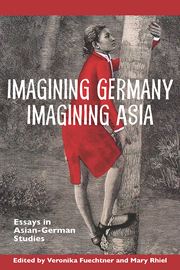Book contents
- Frontmatter
- Contents
- Acknowledgments
- Introduction
- Part I Contemporary Challenges to German Borders and Identities
- 1 East-West Globality and the European Mode of Film Production
- 2 Citizenship-Shifting: Race and Xing-Hu Kuo's Claim on East German Memory
- 3 Narratives of Transnational Divide: The Vietnamese in Contemporary German Literature and Film
- 4 Factories on the Magic Carpet: Heimat, Globalization, and the “Yellow Peril” in Die Chinesen kommen and Losers and Winners
- Part II Travel and Representation
- Part III Asia Inhabits Germany's Cultural and Intellectual History
- Bibliography
- Notes on the Contributors
- Index
3 - Narratives of Transnational Divide: The Vietnamese in Contemporary German Literature and Film
from Part I - Contemporary Challenges to German Borders and Identities
- Frontmatter
- Contents
- Acknowledgments
- Introduction
- Part I Contemporary Challenges to German Borders and Identities
- 1 East-West Globality and the European Mode of Film Production
- 2 Citizenship-Shifting: Race and Xing-Hu Kuo's Claim on East German Memory
- 3 Narratives of Transnational Divide: The Vietnamese in Contemporary German Literature and Film
- 4 Factories on the Magic Carpet: Heimat, Globalization, and the “Yellow Peril” in Die Chinesen kommen and Losers and Winners
- Part II Travel and Representation
- Part III Asia Inhabits Germany's Cultural and Intellectual History
- Bibliography
- Notes on the Contributors
- Index
Summary
Wenn Philipp Rösler Philipp Ngyuen hieße, wäre er nicht Bundesgesundheitsminister
—Minh-Khai Phan-ThiTwo contrasting stereotypes of Vietnamese migrants prevail in the German public imagination: that of the cigarette smuggler and that of the model minority. The fact that few Germans know about the lives of this small but relatively diverse ethnic group is one possible explanation for these contradictory stereotypes. Although Thilo Sarrazin's recent comparison of Turks and Arabs as “bad migrants” unwilling to integrate into German society, and the Vietnamese as “good migrants,” whose children are over-achievers, was intended to redeem them in the public eye, the dominant image of the Vietnamese in contemporary German literature and film, as I will show, is still that of displaced outsiders. A reason for the perpetuation of the negative image may well be that the small Vietnamese community has not yet brought forth a Fatih Akin, the Turkish German filmmaker who has enjoyed great national and international success, or a Feridun Zaimoğlu, the Turkish German novelist and playwright who has published close to twenty books and whose political and literary essays have appeared in a number of German newspapers and magazines. As I will argue, the negative stereotyping of the Vietnamese also needs to be analyzed in the context of the tense relationship between East and West Germans and notions of Eastern Europe as a breeding ground for crime in the years following German unification.
- Type
- Chapter
- Information
- Imagining Germany Imagining AsiaEssays in Asian-German Studies, pp. 50 - 63Publisher: Boydell & BrewerPrint publication year: 2013



